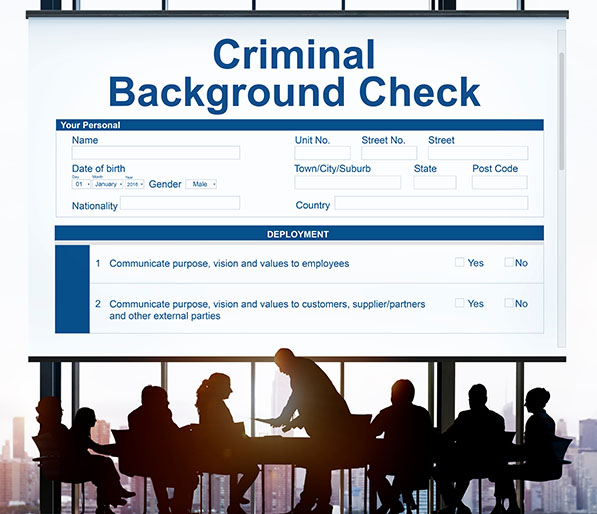As the rulemaking body for the California Civil Rights Department (CRD), the California Civil Rights Council (CRC) has been working for several months on revised regulations related to the use of criminal history in employment decisions under the Fair Chance Act. After several notice and comment periods, the CRC adopted revised regulations on April 23, 2023, which the Office of Administrative Law (OAL) approved on July 24, 2023. These revisions will become effective October 1, 2023.
The revised regulations don’t fundamentally change the rules regarding the use of criminal history — rather they generally seek to clarify employers’ obligations when using criminal history by adding more context and examples to the existing rules.
Prior to a conditional job offer, the law prohibits an employer from inquiring about criminal history unless required by law (e.g., law enforcement, certain government positions, etc.). The revised regulations clarify that, in addition to not being able to ask about criminal history through job applications and internet searches, employers cannot put statements in job advertisements, postings, applications or other materials that persons with criminal history will not be considered for hire, such as “No Felons” or “Must Have Clean Record.”
If an applicant voluntarily discloses criminal history information prior to a conditional job offer, employers may not consider such information until after it has decided whether to make a conditional job offer. Additionally, employers may never consider certain categories of criminal history information (e.g., arrests that did not result in convictions, referrals to diversion programs, etc.). This prohibition still applies even when the applicant voluntarily discloses such information.
After extending a conditional job offer, if an employer intends to deny an applicant the job based on their criminal history, the employer must perform an individualized assessment of whether the applicant’s conviction history has a direct and adverse relationship with the specific duties of the job that justify denying employment.
Existing regulations provided three main factors that employers are required to consider for the individualized assessment:
- Nature and gravity of the offense;
- Time that has passed since the offense or conduct; and
- Nature of the job held or sought,
The revised regulations, however, add several new considerations to each of the three factors above to supplement the assessment’s level of detail. For example, for the first individualized assessment factor above, the regulations specify that consideration of the nature and gravity of the offense may include, but is not limited to:
- The specific personal conduct of the applicant that resulted in the conviction;
- Whether the harm was to property or people;
- The degree of the harm (e.g., amount of loss in theft);
- The permanence of the harm;
- The context in which the offense occurred;
- Whether a disability, including but not limited to a past drug addiction or mental impairment, contributed to the offense or conduct, and if so, whether the likelihood of harm arising from similar conduct could be sufficiently mitigated or eliminated by a reasonable accommodation, or whether the disability has been mitigated or eliminated by treatment or otherwise;
- Whether trauma, domestic or dating violence, sexual assault, stalking, human trafficking, duress, or other similar factors contributed to the offense or conduct; and/or
- The age of the applicant when the conduct occurred.
Employers should review the new criteria, making any necessary changes to their individualized assessment process to ensure that it explains in sufficient detail the conviction history’s direct and adverse relationship with the specific duties of the job.
After an employer provides preliminary notice of its intent to withdraw a job offer based on the applicant’s criminal history, applicants have an opportunity to respond with evidence challenging the accuracy of the conviction information and detailing rehabilitation efforts or mitigating circumstances. The revised regulations add more examples of the types of evidence of rehabilitation or mitigating circumstances that applicants may submit during the process, as well as provide employers with additional factors to consider after receiving information submitted by the applicant and before making a final decision.
The revisions specify that employers cannot require an applicant to provide specific documentary evidence or condition the job on the receipt of specific evidence.
Notably, the revisions expand the definition of “applicant” to include employees who have applied or indicated a desire to be considered for a different position with their current employer as well as employees subjected to criminal history review because of a change in ownership, management, policy or practice.
These latest revisions to the law on using criminal history in employment decisions add depth and complexity to the existing rules. Employers that use criminal history in their hiring process should review the revisions, consult with their legal counsel and make any necessary changes to their screening policies and practices prior to the regulation taking effect on October 1, 2023.
James W. Ward, Employment Law Subject Matter Expert/Legal Writer and Editor
CalChamber members can use the Criminal Background Screening Checklist, Notice of Preliminary Decision to Withdraw Employment Offer – Criminal History Only and Notice of Final Decision to Withdraw Employment Offer – Criminal History Only on HRCalifornia. Not a member? Learn how to power your business with a CalChamber membership.
